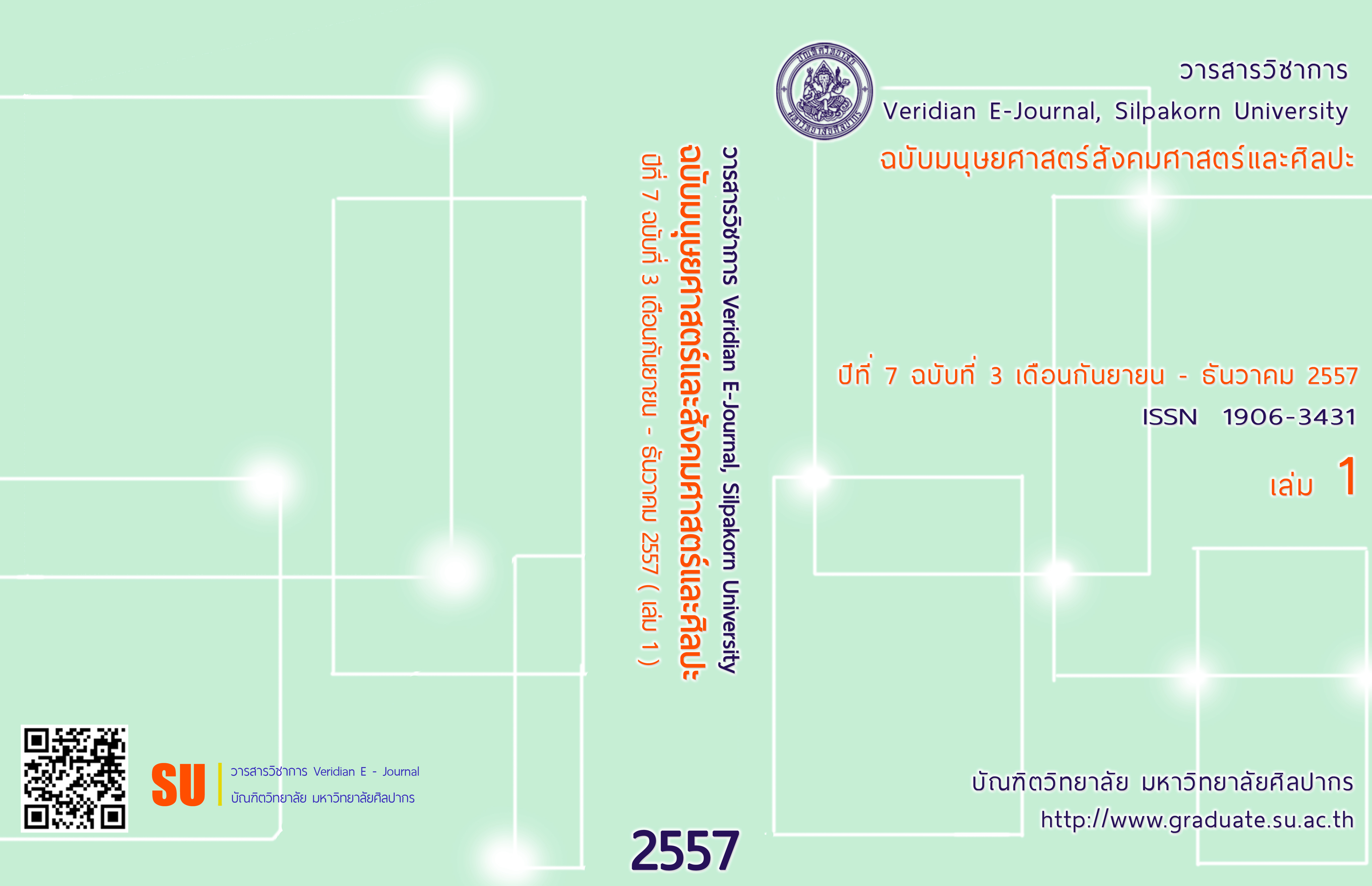การสื่อสารเพื่อสร้างความรู้และเสริมทักษะด้านการรู้เท่าทันสื่ออินเทอร์เน็ต ในระดับเชิงลึกของเยาวชนไทยจากสามองค์ประกอบหลัก
Main Article Content
Abstract
บทคัดย่อ
การวิจัยครั้งนี้ มีวัตถุประสงค์เพื่อศึกษาระดับความรู้และทักษะด้านการรู้เท่าทันสื่ออินเทอร์เน็ตในระดับเชิงลึกของเยาวชนไทยจากสามองค์ประกอบหลัก ซึ่งเป็นกระบวนการที่นำไปสู่วิธีการสื่อสารเพื่อสร้างความรู้และเสริมทักษะด้านการรู้เท่าทันสื่ออินเทอร์เน็ต กลุ่มตัวอย่าง คือ เยาวชนไทยชายหญิงซึ่งกำลังศึกษาระดับปริญญาตรีอยู่ชั้นปีที่ 1 ในภาคการศึกษาที่ 2 ปีการศึกษา 2556 มหาวิทยาลัยหัวเฉียวเฉลิมพระเกียรติ โดยวิธีสุ่มจากการลงทะเบียนเรียนรายวิชาพื้นฐานจำนวนรวม 4 รายวิชา จำนวน 400 คน เพื่อเก็บข้อมูลเชิงปริมาณด้วยการตอบแบบสอบถามและทำแบบทดสอบระดับขั้นต้น โดยแบ่งออกเป็น 4 กลุ่ม ได้แก่ กลุ่มที่ 1) รายวิชา World View & Way of Life กลุ่มที่ 2) รายชื่อวิชา Psychology for Living กลุ่มที่ 3) รายวิชา Thai & Global Situation กลุ่มที่ 4) รายวิชา IT & Learning เนื่องด้วยเป็นกลุ่มวิชาที่มีเนื้อหารายละเอียดของบทเรียนซึ่งมีความสัมพันธ์กับความรู้และทักษะในการรู้เท่าทันสื่ออินเทอร์เน็ต และกลุ่มตัวอย่างจำนวน 52 คน จาก 4 กลุ่มๆ ละ 13 คน เพื่อทำแบบทดสอบระดับเชิงลึกด้วยวิธีการเก็บข้อมูลเชิงคุณภาพ คือ การสนทนากลุ่มย่อย การสัมภาษณ์อย่างไม่เป็นทางการรายบุคคล การสังเกตุการณ์ รวมทั้งการนำข้อสรุปที่ได้ไปอภิปรายกับผู้ทรงคุณวุฒิเพื่อทำบทสรุปสุดท้าย ใช้วิธีการวิเคราะห์ข้อมูลด้วยค่าสถิติ Independent Samples T-Test และการวิเคราะห์เนื้อหา ผลการวิจัยพบว่า ความรู้และทักษะพื้นฐานระดับขั้นต้นอยู่ในช่วงคะแนน 60 – 69 ถือว่าอยู่ในเกณฑ์ปานกลาง และเมื่อทำการทดสอบระดับความรู้และทักษะด้านการรู้เท่าทันสื่อและสารสนเทศจากสื่ออินเทอร์เน็ตในระดับเชิงลึกหรือระดับสูงตามตัวชี้วัดต่างๆ จาก 3 องค์ประกอบหลัก ผลการทดสอบปรากฏว่า กลุ่มเยาวชนไทย ทำได้เพียงในเกณฑ์ “ปานกลาง” เท่านั้น ทั้งนี้เพราะการให้คำตอบจาก 3 ใน 4 กลุ่ม ยังไม่สามารถแสดงความรู้ด้วยการใช้เหตุผลและทักษะการคิดวิเคราะห์ข้อมูลข่าวสารจากสื่ออินเทอรฺเน็ตที่บ่งบอกได้ถึงระดับความรู้และทักษะที่มีอยู่อย่างชัดเจนและครอบคลุมในระดับเชิงลึก โดยสามารถสรุปข้อเสนอวิธีการสื่อสารเพื่อสร้างความรู้และเสริมทักษะด้านการรู้เท่าทันสื่ออินเทอร์เน็ตจาก 3 องค์ประกอบหลัก ได้ดังนี้คือ 1) รูปแบบการสื่อสารหลัก เน้นการสื่อสารระหว่างบุคคล 2) กลยุทธ์การสื่อสารหลัก เน้นกิจกรรมฝึกภาคปฏิบัติ 3) สื่อที่ใช้เป็นหลัก เน้นใช้สื่อบุคคล คือ ครู/อาจารย์
Abstract
The key objective of this research is to study the knowledge and skills with the in-depth Internet Literacy level of Thai youths from the three main components. This is the process that leads to communication methods for the knowledge building and enhancing the skills of internet literacy. The samples of this research were male and female Thai youths who were the first year undergraduate students, studying in the second semester of the academic year 2013 at Huachiew Chalermprakiet University. The samples were randomly selected from the total 400 students who enrolled in the four courses. The quantitative data were collected from a questionnaire and a basic test. They were divided into four groups: 1) the group of the students enrolled in World View & Way of Life course 2) the group of the students enrolled in Psychology for Living course 3) the group of the students enrolled in Thai & Global Situation course 4) the group of the students enrolled in IT & Learning course. The reason why this research was done by choosing the students who enrolled in these courses, it is because the content of these courses were associated with knowledge and skills in Internet literacy. And the 52 samples divided to 4 groups of 13 students were selected for the in depth-analysis by using qualitative data collection methods. The focus groups, Individual informal interviews, observation including the information from the debate with a panel of experts were collected in order to conclude the final finding. Statistical analysis was performed by using the Independent Samples T-Test and content analysis. The results from the basic test showed that knowledge and skill level of samples was in between 60 - 69 considered as the "moderate." In addition, when the samples were tested in the in-dept knowledge and skills of Internet literacy derived from the 3 main components. The results were showed that samples of Thai Youth knowledge and skill level were in the "moderate" level. Because the results from 3 of 4 groups showed that Thai youths were unable to demonstrate knowledge with reasoning and critical thinking skills to facilitate analyze information from the internet. The research summary offers means of communication methods for the knowledge building and enhancing the skills of Internet literacy from the three main components as follows: 1) the main forms of communication was focused on interpersonal communication, 2) the major communications strategy was focused on the workshop training, and 3) the major media was focused on personal media which was the teacher/professor.
